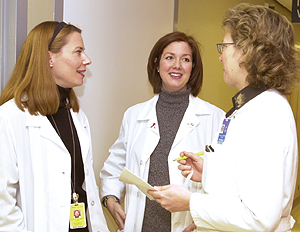The Veteran Epidemiologist Jodie L. Guest, 99PhD, 92MPH, directs HIV research at the Atlanta VA medical center,
“I love the VA,” says Guest. “I never would have guessed that this was going to be my career, but it’s ended up being the greatest job in the whole world.” As home to the second-largest HIV-positive veterans population in the country (New York is first), Atlanta’s VA provides fertile ground for studies ranging from the effectiveness of specific medications to patients’ adherence to antiretroviral therapy. From her office on the 11th floor, Guest oversees a research staff of five, and spends much of her day in supervisory tasks—looking over protocols and deciding which studies to participate in, setting up the data collection, doing the statistical analysis, writing manuscripts.Currently, the clinic is conducting 30 studies; more than 60% of the center’s 1,000+ HIV-positive patients are enrolled in at least one protocol. Since 1982, 2,600 HIV-positive veterans have been seen at the center. “While most epidemiologists don’t have the privilege of getting to know their patients, I have patients who come by my office to chat, or to give me cookies,” says Guest, who has been at the VA for 13 years. “We see the majority of our work implemented in our clinic. It’s a nice thing, to have the personal as opposed to just the statistical.”
About half the clinic’s studies are written in-house; about half are proposed from outside agencies. “What I do now, I couldn’t be doing without my doctorate,” Guest says. “The RSPH was an excellent place to train. The professors were very invested.” Family inspirationGuest had been interested in infectious disease since her first semester, but HIV/AIDS research is of particular interest to her—her uncle and his partner of 26 years died of AIDS when she was in high school and college. “I dedicated my master’s thesis to him,” says Guest, who did her MPH thesis on the treatment of AIDS patients with disseminated Mycobacterium avium complex infection (DMAC)—the infection that killed her uncle. “He got so sick from the medications that he chose to not take them—to live less time, but without the side effects,” says Guest. “I had discussions with him about dying, and he told me a few of his biggest regrets in life—never learning to dunk a basketball, taking organic chemistry . . . .” Guest, who never learned to dunk but did manage to avoid organic chemistry, stays involved in academia by serving as an adjunct professor in the Department of Epidemiology at the RSPH and the Department of Family and Preventive Medicine at Emory’s medical school. She teaches one class in the summer and two classes in the fall, mostly epidemiology and biostatistics, as well as supervising master’s and doctoral candidates. In 2002, Guest received a Golden Apple Award for excellence in teaching at Emory.
“I have pretty long hours on the days I work and I have to be more efficient. But it gives me Mondays and Fridays at home,” she says. “I’ve had a lot of support from my employer and my spouse.” Every once in a while, Guest wonders what it would be like to work in international HIV research. “Do I want to be in the trenches? I have friends who are,” says Guest, pointing to a holiday card she received from a colleague, who is at a CDC field station in Kenya. “That’s a mountain lion up in a tree—she took the photo from her front porch. But that’s not the path I decided to take, though it’s tempting. There’s plenty going on here to keep me busy.” By Mary Loftus
Disease Detective | Instamatic Informatics | The Human Strain | Expelling the Fiery Serpent Corps Class | Class Notes | Rollins School of Public Health
Copyright © Emory University, 2004. All Rights
Reserved. |



